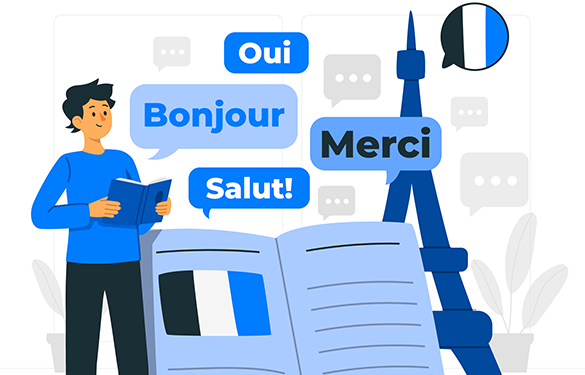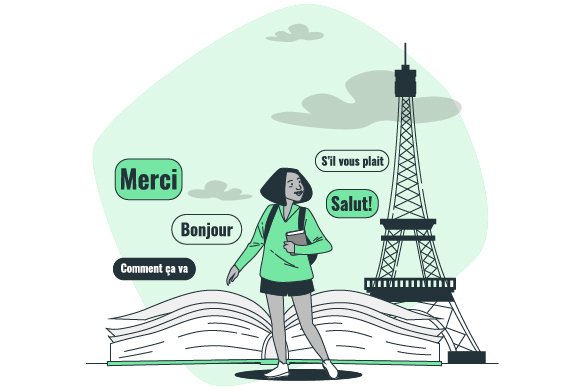Rosetta Translation provides a full range of French translation services to companies in London and worldwide.

Our certified translations are accepted by all UK and US authorities, including the UK Home Office, courts, local authorities, DMV, etc. We can provide all levels and any kind of official certifications, including notarisations, legalisations (apostilles), etc.
Please let us know your precise requirements, and if in doubt, feel free to discuss your situation with our experienced and knowledgeable account managers, who will be more than happy to assist.
Our translation agency specialises in top quality French translation services and has particular expertise in the following sectors:
Legal translation: translating any kind of legal documents, including official personal documents and contracts and agreements.
Financial translation: translating annual financial statements, periodical financial reports etc.
Technical translation: translating user and product manuals, technical reports, etc.
Medical translation: translating medical reports, research reports, manuals for medical devices, etc.
We guarantee a high and consistent quality of French translation in each of these areas of expertise by assigning every translation to the most appropriate specialised team of highly qualified French translators, proofreaders and editors.
We also provide French interpreting services in London and worldwide.
For a free instant quote, please contact us at any of our local offices in London, Shanghai, New York, Paris or Luxembourg.

Rosetta distinguishes itself by being one of very few translation agencies that hold both the prestigious ISO 9001:2015 certification and the DIN EN 15038 norm, the latter being the only norm that specifically addresses translation services. Our customers can therefore rest completely assured that the quality of our French translation services is consistently high.
We only use experienced, native French-speaking translators for all our English-French translation assignments, all of whom specialise in a number of different areas of translation to give the best possible results for our customers. French to English translations are proofread and formatted to suit each client’s individual needs, giving an excellent product.
French (français) is one of the world’s biggest languages. It plays a major role in European business markets and in the European Union. Worldwide, French currently has 120 million native and 52 million second-language speakers. At Rosetta translation, our translators cater for translation into and out of all French dialects. So whether you require Canadian, Togolese, or perhaps Senegalese French translations, our translation agency is well placed to deal with your requests.

Whether your French-English translation assignment is technical, complex or more basic, Rosetta Translation always has experienced translators on hand to deliver, with expertise in a number of areas, from technical computer jargon to pharmaceutical industry terminology.
All our French to English translations are of course completed by native English translators with relevant qualifications in French translation.
Canadian French, also known as Québec French, is natively spoken by a substantial minority of Canadians, about 20.2% of the Canadian population, or about 7.2 million people, according to the 2016 census. It is the only official language in Québec, where French speakers are in a solid 70% majority (and nearly voted for independence from Canada in the past).
First, it should be noted that spoken Canadian French is considerably more different from its European counterpart than the written language. A European French speaker may experience substantial difficulties when listening to a strong Canadian French accent. This is because, on top of the differences in the written languages discussed below, the spoken dialects also differ markedly. The degree of difficulty increases dramatically, the further the speaker moves away from a formal register to casual speech. The other way around, the difficulties disappear almost entirely, because of the substantial exposure of Canadians to European French, through films, media, etc.
For written Canadian French, which obviously concerns us more in the context of French translation, the difference result primarily from the considerable influence of English on Canadian French, resulting in anglicisms in almost all aspects of the language.
There is – understandably, given the bilingual nature of Canada – a large number of English loan words in Canadian French, which would be unacceptable in Metropolitan French, such as “sweet” or “short”.
It gets more complex when the same French words are used, but Canadian uses it in the English way, rather than the French way. Take the word pathétique, which basically means ‘moving’ in European French, but is used in the modern English meaning of ‘pathetic’ by Canadian French speakers.
These differences extent to syntax. Thus, a good ten minutes would be translated into Canadian French as un bon dix minutes, rather than the Metropolitan French translation of dix bonnes minutes.
In addition to the influence of English, there are also loan words from other languages (both languages of native Canadians and other immigrant languages). The sheer fact of having developed separately for several centuries also adds to the increasing linguistic gap between the two variants.
It depends on your document and on your goals. As written Metropolitan French is intelligible to Canadians, there is for example no pressing need to get technical manuals translated.
For any immediately ‘customer-facing’ documents, however, and particularly if you have a substantial interest in the Canadian market, you should consider commissioning a specific Canadian French translation. Beyond mere comprehension, potential customers will just feel more engaged if they are addressed in their own variant, and this is likely to be reflected in increased sales, for what is quite a modest cost.
Yes, that is usually possible, and will be cheaper than a translation from scratch. The result may not be as quite as native as it could be, because of issues such as the syntactic differences discussed above. However, it will in most cases be sufficiently Canadian French and definitely vastly preferable to a European French document.
The arguments for and against Swiss French are largely analogous to those for Canadian French, but the differences are less severe than for the latter. In other words, a Metropolitan French document will be intelligible to a Swiss French, but an adapted Swiss French translation would be preferred, and would therefore often result in better outcomes.
While Parisian French is perfectly intelligible to Belgians, there are definitely belgicisms, and a Belgian reader would quickly recognise a text as French rather than Belgian. On a sliding scale, the differences are less than for Swiss French (for which in turn, they are considerably less than for Canadian French). Our recommendation therefore would be to consider having your document edited for use in Belgium if the document is client-facing.






What is the UN French Language Day? On 20 March, we once again celebrate UN French Language Day, a global celebration of linguistic diversity and cultural exchange. Created by the United Nations in 2010, this day is to remind us …


© 2025 All Rights Reserved